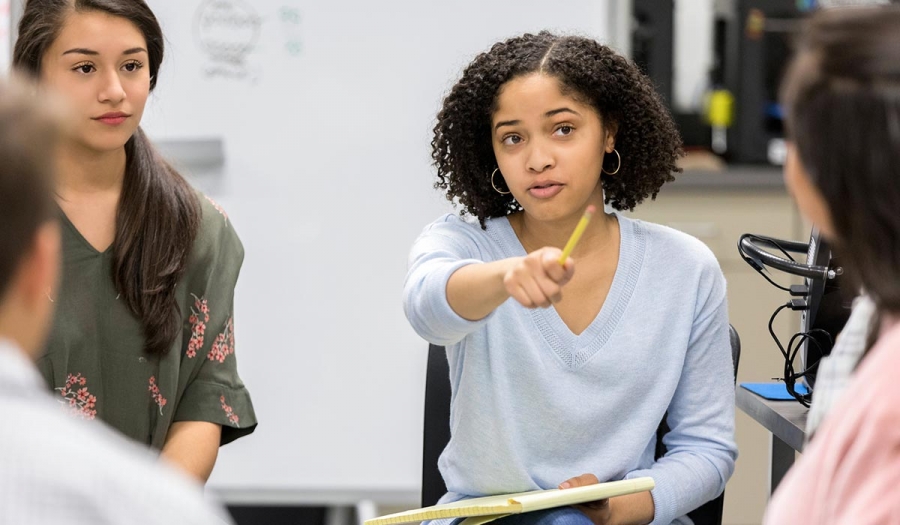By exposing our students, in the English classroom and beyond, to these pieces, we are opening their minds to the possibility of understanding and interpreting an era with a greater level of depth and understanding. However, this glimpse into the past can’t be the only exposure that our students have to society. What we need to do is nurture and develop the past by presenting them with the present and the possibilities of the future.
We often mention that a true and realistic curriculum cannot be fixed. It can never be labelled as complete, as the curriculum needs to be reviewed in order to reflect the demographic. Over time, society, cohorts and current affairs change and we need to ensure that these changes are reflected in our classroom teaching.
I’ve written before about the need for students to be provided with the skills and knowledge that they will have to exhibit when they leave the protective embrace of education, and venture into the uncensored world of the many. They will no longer be in an environment where mistakes will be highlighted and rectified by others. Instead they will have to reflect and consider the persona that they exhibit to audiences and the communication skills they demonstrate.
Because of this, there is something that we need to remind ourselves of:
Domain-specific conversation may be had with the few, but the ability to discuss and reference current affairs opens communication with the many.
Students should be able to write a speech or a presentation for work because they have been provided with the words of the greats (and the not-so-greats for a diverse reference). They should be encouraged to participate in debates about subjects that actually matter to them. Subjects that result in an emotional response being charged up and developed into a refined articulation of emotions.
Students should be able to communicate effectively with colleagues or their employers, because they have been given the skills and knowledge to do so through the exposure to current affairs. By providing them with knowledge, we therefore provide them with the confidence that can be sustained long after education has left their rear-view mirror.

In order to do this, there are a few simple, supportive approaches that can begin to open this dialogue:
- Start off small - Current affairs can’t necessarily be embedded into the curriculum, because they haven’t necessarily all happened yet! Larger topics or tasks may need to result in more of a reactive response as opposed to an intricately laid plan of objectives and outcomes. This is why verbalisation and the encouragement of oracy skills are so effective in these circumstances. You could consider strategies such as:
- Having a weekly allocated time where you watch the news and discuss or share a newspaper article discussion.
- Encourage independent research and opportunities so that students can begin to lead the discussions. This approach is definitely more of a facilitative strategy.
- Introduce ‘devil’s advocate’ statements that you know will encourage an emotional response, and allow them time to plan their arguments/viewpoints before a discussion.
- Be sensitive, not redacted - We would be doing a disservice to our students if we ignore or redact the truth. Obviously, there may need to be some censorship and understanding when considering contextualisation. It’s important to recognise that the most talked about current affairs are often the most controversial topics. Whether this is racial equality with the ‘Black Lives Matter’ movement, or gender equality with the ‘He for She’ campaign (as just two of the many examples), it’s important that students are constantly provided with the opportunity to discuss these matters, by being provided with the most suitable facts and resources for that particular demographic. What we should then be able to see is that these open and honest discussions pave the way for a more open and reflective society.
- Set the bar of excellence with evidence - We need to champion the individuals that do the right thing. Sometimes students become cocooned in this shelter of school life, and they consequently have difficulties with relating skills with real life scenarios. By changing the dialogue, we can therefore change the way that students see a task, and how it can relate to post-academia. For instance, instead of ‘write about an individual’, it’s ‘write your personal statement’.
At the end of the day, our students have a right to a broad and balanced curriculum. Part of this curriculum has to be their ability to function in everyday life, but that doesn’t mean that we have to change the game and add another piece. We can just change and position them so that everything can begin to piece together.
After all, only by looking at the present with a critical eye, can students begin to truly evaluate the impact of our great literary heritage.
![]() Looking for more resources to support your teaching and learning? Check out the best education technology resources on our sister platform EdTech Impact.
Looking for more resources to support your teaching and learning? Check out the best education technology resources on our sister platform EdTech Impact.


















